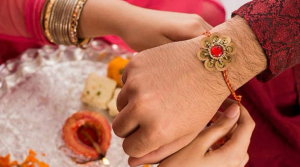 नई दिल्ली : नई दिल्ली : August 8, 2025 | New Delhi : Raksha Bandhan, one of India's most cherished festivals, is more than just a thread tied on the wrist, it's a vibrant celebration of love, duty, and the eternal bond between siblings. Observed on the full moon day of the Hindu month of Shravan (usually in July or August), this festival has evolved through centuries, transcending religious, cultural, and geographical boundaries to remain relevant in both tradition and spirit.
Ancient Roots in Myth and Legend
The origins of Raksha Bandhan can be traced back to various stories in Indian mythology and history. One of the earliest mentions comes from the epic Mahabharata. According to legend, after Lord Krishna injured his finger during battle, Draupadi tore a strip from her saree to bandage it. Touched by her gesture, Krishna vowed to protect her at all costs—a promise he later fulfilled during her public humiliation in the Kaurava court.
Another well-known tale recounts the story of Queen Karnavati of Mewar, who sent a rakhi to Mughal Emperor Humayun, seeking protection from an invading army. Humayun, moved by the symbolic request, set out to defend her kingdom, though he arrived too late. Still, the gesture underscored the power of the rakhi as a plea for help and a token of alliance.
These stories and many others contribute to the deep spiritual and emotional significance of Raksha Bandhan. In Sanskrit, "Raksha" means protection and "Bandhan" means bond, encapsulating the festival’s core message.
Significance in Modern Times
Traditionally, Raksha Bandhan involves a sister tying a rakhi (a sacred thread) on her brother’s wrist, symbolizing her love and prayers for his well-being, while the brother pledges to protect her throughout her life. The ritual is often accompanied by the exchange of gifts, sweets, and warm memories.
However, in contemporary India, the definition of the festival has expanded. It's no longer confined to blood relations—rakhi is now tied between cousins, friends, and even as a gesture of communal harmony between people of different faiths. Many sisters who don’t have brothers celebrate the festival with sisters or father figures, redefining the idea of protection and support.
Changing Faces of Tradition
Urban lifestyles and nuclear families have also changed how Raksha Bandhan is celebrated. Video calls, e-rakhis, couriered sweets, and digital gift cards have replaced in-person ceremonies for many families separated by distance. Despite the changes, the emotional core remains intact—reminding us that bonds built on love and trust endure even across miles.
Eco-conscious celebrations are also on the rise. With greater awareness about sustainability, many artisans are creating rakhis made from seeds, paper, and biodegradable materials. These environment-friendly rakhis sprout into plants when buried, symbolizing growth and nurturing—core elements of any strong relationship.
Cultural and Economic Impact
Beyond its emotional appeal, Raksha Bandhan has a significant cultural and economic impact. Markets come alive weeks in advance, buzzing with colorful rakhis, gifts, sweets, and apparel. From street vendors to e-commerce giants, businesses of all scales witness a seasonal boost in sales. Jewelry, gadgets, clothing, cosmetics, and personalized gifts top the charts in sibling shopping sprees.
Temples and spiritual centers also play a role, organizing community celebrations and pujas. Some temples even conduct symbolic ceremonies where rakhis are tied to deities or sacred trees, reinforcing the ritual’s spiritual undertones.
The Bond Beyond Borders
Interestingly, Raksha Bandhan is not just limited to India. It is observed by the Indian diaspora across the globe, from the U.S. and Canada to the U.K., Australia, and the Middle East. In some cases, even local communities participate in the festival as a way of embracing Indian culture and fostering intercultural understanding.
International rakhi campaigns have also taken root, where people tie rakhis to soldiers, police officers, and frontline workers as a gesture of gratitude. Such efforts underline the evolving definition of protectors in society and the timeless relevance of this festival.
A Thread That Binds
At its heart, Raksha Bandhan is a celebration of human connection—of promises made and kept, of love that protects, and of memories that endure. Whether through ancient legends or modern interpretations, its message remains clear: in a world often divided by differences, the simple act of tying a thread can remind us of our shared humanity and the strength we find in each other.
As families across the country prepare to mark Raksha Bandhan this year with rituals, rakhis, and sweet treats, the essence of the festival endures—a thread not just of silk, but of sentiment, tradition, and unbreakable bonds. |